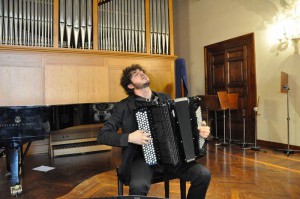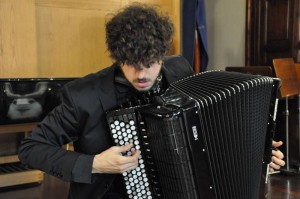 The accordionist, protagonist of the weekly interview, is the young Andrea Pennacchi, another brilliant exponent of the school of Maestro Tomassetti and now just graduated cum laude at the Conservatorio Santa Cecilia …
The accordionist, protagonist of the weekly interview, is the young Andrea Pennacchi, another brilliant exponent of the school of Maestro Tomassetti and now just graduated cum laude at the Conservatorio Santa Cecilia …
Andrea, despite your young age, reading your studies I can see an eclectic personality comes out (competitions, concerts, theater, chamber music). What does it drive you through these interests? What kind of position does the accordion have in these different worlds?
I was lucky to start my music studies with a great teacher, Renzo Tomassetti, a person who has given and is going on to give his own life to the accordion. He has conveyed the love for this instrument, and a work’s method based on perseverance and sacrifice, virtues that I bring with me. Now, living in a city like Rome, I realize that there are a lot of concert opportunities (solo and not) and collaborations with important partners.
I had the opportunity of work with the Accademia Nazionale d’Arte Drammatica “Silvio D’Amico” and with the Teatro dell’Opera di Roma; what it has impressed me mostly, is have seen guys, from different Italian cities, pursuing their own purpose with the same passion I do.
Also for them the passion is the motor that push themselves ever forward.
Nowadays the accordion is getting more importance, also in the theatres.
Even if it is considered, from someone, an “hybrid” instrument, with a folk identity, è09’m sure it will have the prestigious it deserves.
This is up to us: playing a lot and offer to the audience high level programs showing the multifunctionality of the instrument
What is the best repertoire for an accordionist? What have you choosen? Why?
I think that a good accordionist should be able to play any repertoire, however it’s necessary to have a knowledge base of everything and then choose his/her own way. Accordion gives the possibility to play a various repertoire: baroc, contemporary, jazz and much more. It’s a serious mistake study just one or few of them, because there will be gaps and limits in the musical development. An organ work, for example, needs a very deep study of the bellow, about inversions and sound pressure.
Exclude this repertoire means avoid fundamental aspects of an accordionist. The same for contemporary music: it’s important to know and study the techniques that today composers adopt.
My choice is linked to the academic contest I live and believe in: Conservatory. I’m lucky I can play a various repertoire thanks to openness and preparation of my teacher, Massimiliano Pitocco. About transcripts there are reference authors: Johann Sebastian Bach, Domenico Scarlatti, Felix Mendelssohn, like Semionov and Kusyakov for original works.
There is also interest of the new compositions, thanks to the collaboration with young composers that love write for our instrument.
You had the opportunity to know very big teachers coming from several schools. What of these you fell yours?
It’s strong to make a choice when we’re talking about the best accordionists in the world; all of those I ‘ve known have left an own imprint and vision fundamental for my musical growth. Since many years I took part at the Masterclass in Arpino (FR) and at Festival Contemporaneamente Fisarmonica in Roma, in which the best accordion players give lessons. In particular I’ve appreciated Yuri Shishkin and his didactics that I think it is precious for a concert player. His teachings are like his way of playing: a teacher that “teaches playing”. An other great teacher is Xiao Qing Cao. In him I admired that capacity and the want of identify oneself with the student and touch his/her difficulties. This aspect, basic for a teacher, I found in my own teacher and, even if it seems obvious, only few have it.
There have been collaborations with young composers. Do you think it’s important work together another musician on new music? What has a composer to know mostly about accordion?
The collaboration composer-music player is very important for the new music and accordion. Last September I had the opportunity, together others my colleagues of Santa Cecilia Conservatory, to take part in a project with composition’s student. We had a concert in Roma (during Festival Contemporanemente Fisarmonica) and in Castelfidardo (in “Salone degli Stemmi” during the PIF 2014), in which we played 12 première for solo accordion and chamber. It was a great occasion to spread the modern language of our instrument to musician and not.
Generally I found a shortage of accordion’s technique knowledge. From the extension (64 notes on the right and 58 on the left), the chance to change different registers also during the execution and much more.
Composers and accordionists should live symbiotically and the collaboration between the 2 classes should be in every Italian Conservatory.
You are a student of the most prestigous Italian Conservatory, Santa Cecilia in Rome, in what have the institutions to improve for the development of their own talents?
At didactic level I can’t ask better than I have. The quality of the teachers I have and had is very high and enviable. The best method that an academic system can use for the growth of its talents is let them play to the audience all the times is possible and give them occasions to show themselves. In the Conservatories there are a lot of guys with great musical qualities, but often they can express only in their own house.
The system is perfect when it trains, perfects and promote on music business its students. Santa Cecilia Conservatory is very close to this target, having given to the music world excellent musicians, and about my circle, excellent accordionists.
 How is considered our instrument in academic world?
How is considered our instrument in academic world?
The accordion’s situation in academic world is a bit ambiguous. In some Conservatory it has an even more important role, with numerous classes and very known teachers. The problem is in Conservatory where there isn’t the accordion’s class. In Umbria, for example, there isn’t the possibility to study in Conservatory: neither in Perugia nor in Terni there is accordion’s class. This is a paradox, considering that this region is the “mother” of a lot of accordionists that have to go away to go on with their studies. The same thing is for other cities of Italy like Napoli, Bologna, Cagliari. I hope the growth’s process accordion is in will go on, until every Italian Conservatory will have an accordion class.
Are there some musicians who represent a model for you?
Luckly, we have the opportunity to see and learn from great accordionists. I had the privilege listening 2 among the top: Yuri Shishkin and Mika Vayrynen. The first one, I had some masterclass with, is surprising for the energy that he conveys and the feeling with his instrument. The second is formidable for the simplicity and naturalness through he makes what for the others is the possible’s limit. Both, more than an uncommon agility, have a conscious bellow and sound’s control that makes their own technique complete and with no defects.
Your favourite composer?
Johann Sebastian Bach. There are no words to describe the vastness of this composer. All his works, sacred and profane, deeply touch the soul as any composer can do. Accordion perfectly marries part of his instrumental music. I’m sure that if he knew directly this instrument he would give many works to it.
The future. What do you expect and what are your dreams?
In this moment I’m attending the Master in accordion in Rome. After my studies I hope to have a concert activity and start a teacher’s way. I have some projects, as soloist and chamber, and I hope to realize them very soon. I’m doing some collaborations with elettronic’s composers for new experimental accordion pieces. I have to study a lot, but there are also the motivations.
Andrea Pennacchi is born in Rome the 6th of March 1991 ad he soon discovers his love for the accordion.
He graduated in accordion in October 2014 at the Conservatory Santa Cecilia in Rome with the highest valuation under the guidance of M° Massimiliano Pitocco.
Under the teachings of M° Renzo Tomassetti in 2000, he started the study of music, holding his first accordions. He won several competitions, both national and international such as: “Trofeo Città di Cerchio”, “Trofeo Città di Capistrello”, “Trofeo Wolmer Beltrami”, “Trofeo Città di Atri”, “Trofeo Città di Gualdo Cattaneo”, “Trofeo Città di Sora”, “Adamo Volpi”, “Trofeo Stefano Bizzarri”, “Trofeo Città di Atina”, “Premio Leo Ceroni” (with the Philarmonic of Reggio Emilia).
In November 2013 he worked together with the National Academy of Dramatic Art “Silvio d’Amico” for the show “cit(t)azioni”, during the main event “Una notte al museo”.
In January 2015 he worked together with Roma “Teatro dell’Opera” for the show “Brundibàr” conducted by M° Carlo Donadio, in Palladium Theatre (Rome).
He performed in theatres and important shows. Among them we remember: Teatro Eliseo (Rome), Teatro Palladium (Rome), Festa Europea della Musica (Rome), Museo Nazionale D’Arte Orientale (Rome), Casa Menotti (Spoleto), PIF 2014 (Castelfidardo) and much more.
He participated in several masterclasses with the most important accordionists in the world as Manca Jean Luc, Frank Angelis,Yuri Shishkin, Alfred Melichar, Raimondas Sviackevicius, Ciao Xiao-Qing, Ranieri Adriano, Flammini Dario, Scigliano Giuseppe, Rojac Corrado and Jacomucci Claudio.
Actually he is studying at the Conservatory “Santa Cecilia” in Rome with M° Massimiliano Pitocco to improve his accordion skills.
Questo post è disponibile anche in: Italian

 English
English Italiano
Italiano 





Leave a comment
You must be logged in to post a comment.